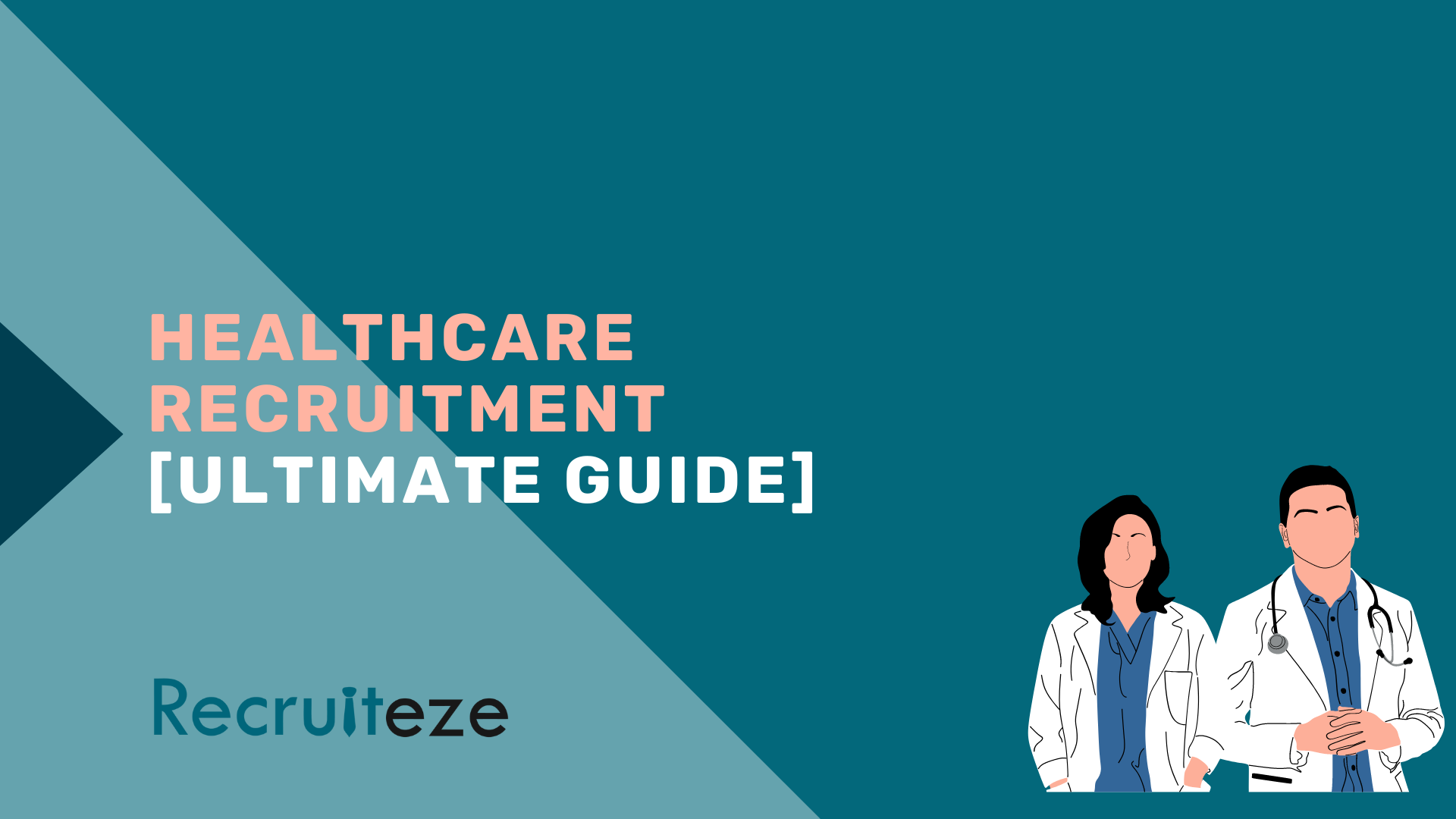
Healthcare recruitment has become more competitive and volatile than ever. Hiring and retaining employees has become increasingly difficult after the COVID-19 outburst.
Aside from the fact that it’s not cost-effective to replace employees, turnover can cause an issue with the care of patients. Having low turnover will enhance the quality of patient care and help the healthcare industry continue to be a competent, effective workforce that is continually successful.
Below, you will learn everything you need to know about current trends and challenges in healthcare recruitment, and how to tailor your healthcare recruitment strategy towards them.
What is healthcare recruitment?
Healthcare recruitment refers to the process of sourcing, attracting, interviewing, hiring, and onboarding healthcare professionals such as doctors, nurses, healthcare administrators, pharmacists, technicians, therapists, and other healthcare workers. It’s a crucial aspect of the healthcare industry to ensure quality patient care and smooth operation of healthcare facilities.
Healthcare recruitment can be a challenging process due to several reasons:
- Shortage of skilled professionals: There is a consistent demand for healthcare professionals, and in many areas, supply does not meet demand. This results in a constant need for effective recruitment strategies to attract and retain talent.
- Compliance requirements: The healthcare industry is heavily regulated. Recruiters must ensure that all candidates meet strict requirements for licensure, certification, and continuing education.
- Specialized roles: Many healthcare roles require specific skills and experiences. Finding candidates with the right specialization can be difficult.
- High turnover rates: Healthcare can be a stressful industry, and burnout rates can be high. This means recruiters often need to fill the same positions multiple times.
- Changing technology: As technology advances, new roles are created and existing roles require new skills. This can make it challenging to find candidates with the needed expertise.
Healthcare recruiters can be in-house HR professionals within a healthcare organization, or they can be external recruiters or agencies specializing in healthcare recruitment. They use a variety of tools and strategies, including job boards, social media, professional networking, healthcare recruitment software, and career fairs to find and attract potential candidates.
Understanding the current trends and challenges in the healthcare recruitment industry
High Competition

The economy seems to be getting better every day. However, many are still without work.
Some companies can’t afford new employees and they are worried about hiring too many, in case there is another recession.
While there’s no labor shortage, many recruiters are reporting that they’re having trouble finding top talent in their industry. Healthcare is one of those sectors. The shortage of candidates is the biggest challenge in Healthcare IT.
In a survey done by the Health Information Management and Systems Society suggested that technology is moving more rapidly than people can keep up with, especially in the healthcare industry. Things like Electronic Health Records (EHR) are causing this problem.
Those who graduate with an IT degree aren’t usually qualified to work in healthcare because of the ever-changing technology. They’re not able to teach the latest advances because they are constantly changing.
Because of this challenge, there aren’t many potential candidates. This means the competition between recruiters is very high.
Baby Boomers are retiring
Baby boomers are aging and retirement is near for this generation. And, believe it or not, the healthcare industry is made up of 2.5 million baby boomers!
That means that as this generation starts to retire, there will be a devastating blow to this sector. The domination of Gen X is causing concern in terms of how volatile the sector will become when the baby boomers begin to retire in masses. The stability of healthcare lies within these workers.
We can’t expect them to hang around and work forever, but when the time comes – and it’s already starting to happen – the future of healthcare in terms of recruiting will be forever changed.
Shortages of nurses and physicians in this field will be the biggest impact. This generation makes up 28 percent of the population.
Estimates are that by 2030 there could be a shortage of up to 100,000 physicians or more due to retiring baby boomers.
As they retire, they’ll no longer work within healthcare but also need to rely on healthcare. This alone will cause a surge in the need for more services.
The goal at this point for many recruiters is to persuade current baby boomers to stay on the job as long as possible before retiring. As it stands, one in ten Gen X workers says they’ll never retire. Let’s hope for now that it’s true. The more that continues working, the better of the industry will be for now.
Retention

David L. Longworth, M.D., chair of the Medicine Institute at Cleveland Clinic, part of the nonprofit multispecialty academic medical center specializing in studies that approach improving patient-centered care.
“Healthcare reform is forcing hospitals to reconsider how to deliver value-based care. It also causes hospitals to consider new roles like care coordinators and clinical pharmacists who can focus on the management of medically complex patients.”
The Affordable Care Act that went into effect in 2014 left hospitals, providers, and healthcare systems with problems retaining current employees. More than 30 million Americans were newly insured. This left a need to increase retention.
Why?
Employees need a valid reason for staying on. Creating a place that not only removes barriers but also promotes long-term satisfaction is key.
Increased Need for Healthcare
As we mentioned above, baby boomers are beginning to retire. That means they’re also at an age when health problems come into play.
The need for healthcare is going to increase tenfold in the next 10 years.
That means these unique issues will not only affect the industry but also recruiters in this sector. There will be a need for not only replacing those that retire but also adding more employees to make up for the increased need for services.
Costs are skyrocketing

Another trend to look at is spending in the healthcare industry. By 2026, spending could reach upwards of $6 trillion.
This could be spent on medical equipment and medication as well as the healthcare workforce. Though there seems to be a shortage in healthcare workers, that doesn’t mean that the industry will not continue to grow.
In addition, there will be a continued need for workers in this industry.
Evaluating candidate experience
In general, recruiters across the board should be more aware of their candidate experience. However, in the healthcare industry, where things are very competitive due to a shortage of candidates, this trend should be a real consideration for improvement.
Taking time to evaluate and revamp your candidate experience can make a difference.
Building a base of passive candidates
Because of the shortage that is being faced now and in the future, taking time to better understand how to obtain passive candidates is a big trend for the following years.
Passive candidates, unlike active candidates, might not be actively seeking employment but could be interested in switching healthcare facilities if the offer is one they can’t refuse.
Embracing AI
Healthcare recruiters will need to embrace artificial intelligence in healthcare recruitment.
Just like many other workforce industries, artificial intelligence is beginning to be a must-have when it comes to administrative tasks, the hiring process, and more.
Healthcare recruitment strategies for 2022

Based on the current industry trends and challenges, here are some of the best strategies you can utilize when recruiting for the healthcare industry:
- Offering competitive salaries
- Utilizing personality tests and interviews
- Working on employee engagement
- Keeping mental health in check
Healthcare recruitment strategy 1: Offering competitive salaries
Whether you’re hiring CNAs, registered nurses, LPNs, or other positions, make sure your salaries are competitive.
Without a wage that provides for your employees’ cost of living, it’s hard to combat high turnover. When compensation is at a competitive level, workers won’t have to worry about finding a new position in another healthcare system that pays more.
All hospital workers and other healthcare facility employees are important, not just nurses and doctors. Remember to consider housekeeping, medical assistance, dietary staff, and administration, as well. All of these workers go into making help your system successful with a high standard of patient care.
Healthcare recruitment strategy 2: Personality tests and interviews

As with all industries, hiring new talent should be done in a way that’s a great fit for your organization.
When your new hires are not able to fit in with your company culture, it can cause an issue both in the beginning and long term.
Consider conducting peer interviews.
This will help ensure candidates are able to meet their future coworkers as well as meet other healthcare workers that are high-performing, quality talent.
They will also be able to meet department directors and HR staff. Working with peer interviews can consist of two to four candidates who are top picks with recruiters. Once peers have met with these workers, they have the final say over the hire.
This will make certain that the company’s culture will be a great fit for the new employee.
Besides, you may want to try out personality tests for hiring too.
Healthcare recruitment strategy 3: Employee engagement
Employee engagement is essential.
Many times, we only focus on the satisfaction of our workers. However, some people are satisfied to have a job but not happy with the company in general.
Focusing more on employee engagement will help you retain employees. It will also help with your company’s culture.
Many times, this culture speaks for itself when finding new hires.
Healthcare recruitment strategy 4: Keep mental health in check
According to beckerhospitalreview.com,
“One of the unique concerns healthcare organizations have about their employees is the emotional toll of dealing with sick patients, many who may be facing death. Because of these demands, we have our own, in-house employee assistance program with several professional counselors who are available to our employees. The counselors are able to address home, work, financial and personal problems so that their effect on an employee’s life and work is reduced. While some attrition is natural due to retirement and relocation, these programs have helped Mercy Hospital keep our turnover rate below 10 percent for the last seven years. Top quartile performance for healthcare turnover is approximately 11.4 percent or lower.”
Ensuring your employees have access to counseling improves your employer brand, attracts more candidates, and retains more employees.
Healthcare recruitment strategy 5: Partnerships with educational institutions
This is a proactive healthcare recruitment strategy that leverages a symbiotic relationship between healthcare organizations and educational institutions. This strategy can significantly enhance an organization’s ability to attract fresh talent while contributing to the development of the next generation of healthcare professionals.
These partnerships typically involve healthcare organizations collaborating with medical schools, nursing colleges, and other health-related educational programs. The goal is to establish a pipeline of skilled, newly-graduated professionals eager to start their careers in the partnering organization. This includes not just doctors and nurses, but also allied health professionals like technicians, pharmacists, and therapists.
One effective approach is the creation of internship, residency, or fellowship programs that give students real-world experience while still under the guidance of experienced professionals. These programs not only equip students with valuable skills but also offer healthcare organizations an opportunity to evaluate potential future employees.
Moreover, these partnerships provide opportunities for continuing education and professional development, reinforcing a culture of lifelong learning and skill enhancement. They foster a sense of community and shared purpose between education and healthcare institutions, contributing to the overall strength of the healthcare sector.
In essence, partnerships with educational institutions offer a win-win proposition for both the healthcare organization and the students, bridging the gap between academic learning and practical healthcare delivery.
Healthcare recruitment strategy 6: Travel nurse programs
As a healthcare recruitment expert, it’s crucial to understand the role and potential of Travel Nurse Programs in today’s dynamic healthcare landscape. Travel nursing, a unique and increasingly popular aspect of the nursing profession, involves nurses taking on short-term assignments in locations across the country, or even internationally. These assignments often last between 8-13 weeks, although they can be shorter or longer.
Travel Nurse Programs offer a mutually beneficial solution for healthcare institutions and professionals. For healthcare organizations, these programs help fill staffing gaps, especially during peak times, such as flu season, or in areas with a shortage of healthcare professionals. They also provide an opportunity to infuse fresh perspectives and practices into the existing team, thereby fostering an environment of continuous learning and improvement.
For the nurses, these programs offer an exciting opportunity to gain diverse experiences, work in a variety of healthcare settings, and explore different parts of the country or world. This professional diversity often leads to accelerated skill development, making them highly valuable members of the healthcare workforce. Plus, the financial incentives, housing allowances, and travel reimbursements often associated with these roles make them attractive career options.
Healthcare recruitment strategy 7: Spotlight on advanced practice professionals
In an era of evolving healthcare demands, Advanced Practice Professionals (APPs) such as Nurse Practitioners (NPs) and Physician Assistants (PAs) have gained unprecedented prominence. Offering comprehensive healthcare services, APPs are trained to diagnose illnesses, develop and manage treatment plans, prescribe medications, and often serve as a patient’s primary healthcare provider.
Emphasizing the roles and capabilities of APPs in recruitment initiatives can attract an extensive pool of highly trained professionals ready to impact healthcare delivery positively. The strategy should underscore the importance and value of APPs, not only as gap-fillers but as pivotal contributors to the healthcare team.
Job listings should be crafted to highlight the benefits and opportunities that come with these roles, like autonomy, direct patient interaction, scope for diverse clinical experiences, and leadership opportunities. Recruitment advertisements can be tailored to resonate with the career aspirations of APPs, who often value both clinical and interpersonal aspects of care delivery.
Furthermore, partnerships with academic institutions offering advanced nursing and PA programs can aid in sourcing potential candidates. Regular participation in relevant professional events and conferences also offers excellent networking opportunities.
With a focus on APPs in recruitment drives, healthcare institutions can access a rich talent pool that’s ready to cater to diverse patient needs while contributing to the organization’s overall effectiveness.
Healthcare recruitment strategy 8: Telemedicine opportunities
Telemedicine is revolutionizing the way healthcare services are delivered, offering significant benefits to both patients and healthcare professionals. This shift towards virtual care offers a new frontier for recruitment strategies.
For healthcare organizations, promoting telemedicine opportunities can open doors to a broader candidate pool. Geographical boundaries become less of a constraint when healthcare professionals can provide services from any location. This can be particularly beneficial in attracting talent to serve in rural or underserved areas, where patients often have limited access to care.
For healthcare professionals, telemedicine can offer increased flexibility and work-life balance. The potential to work remotely may appeal to a wide range of candidates, including those with family commitments or those seeking to reduce commuting time.
In recruitment campaigns, it’s crucial to highlight how the organization supports telemedicine. This could include details about technological support, training, scheduling, and how telemedicine integrates with other services. Showcasing success stories of telemedicine in your organization can also help to attract candidates.
Telemedicine isn’t just a trend; it’s a substantial shift in healthcare delivery. Emphasizing opportunities in this area can position your organization as a forward-thinking employer, attractive to healthcare professionals seeking to be at the forefront of their field.
Healthcare recruitment strategy 9: Wellness programs for staff
Promoting wellness among healthcare workers is a critical strategy for recruitment and retention in today’s healthcare organizations. It signals an employer’s commitment to staff well-being and creates an environment that fosters health and happiness.
Wellness programs can range from on-site fitness centers, stress management classes, nutritional coaching, to flexible work schedules and mental health resources. These programs can help reduce stress, improve overall health, boost morale, and decrease absenteeism.
When recruiting, it’s important to highlight these programs as part of the organization’s commitment to supporting its staff. This not only positions the organization as a desirable place to work but also shows potential employees that their health and well-being is a priority.
Job listings and promotional materials should detail the available wellness programs. Moreover, success stories from employees who have benefited from these programs can be a powerful tool for demonstrating their value and effectiveness.
Recruiting healthcare professionals is about more than just offering a job. It’s about creating an environment where they can thrive professionally and personally. By promoting wellness programs for staff, healthcare organizations can attract quality candidates who value an employer that invests in their well-being.
How technology helps healthcare recruitment

Healthcare recruitment is a complex and competitive process. With so many qualified candidates vying for limited positions, employers must find ways to stand out from the crowd. Technology can be a powerful tool in this process, giving employers an edge in attracting and hiring the best talent.
By using technology in healthcare recruitment, employers can:
- Reach a wider pool of candidates
- Screen candidates more efficiently
- Connect with candidates on a personal level
Recruiteze offers a solution that can help both for applicant tracking, and resume sourcing and reformating. Check our software ATS Recruiteze, and resume reformatting tool iReformat
Read more from us:
4-Day WorkWeek: Pros, Cons, and Hidden Costs 2022
How to start a healthcare staffing agency
